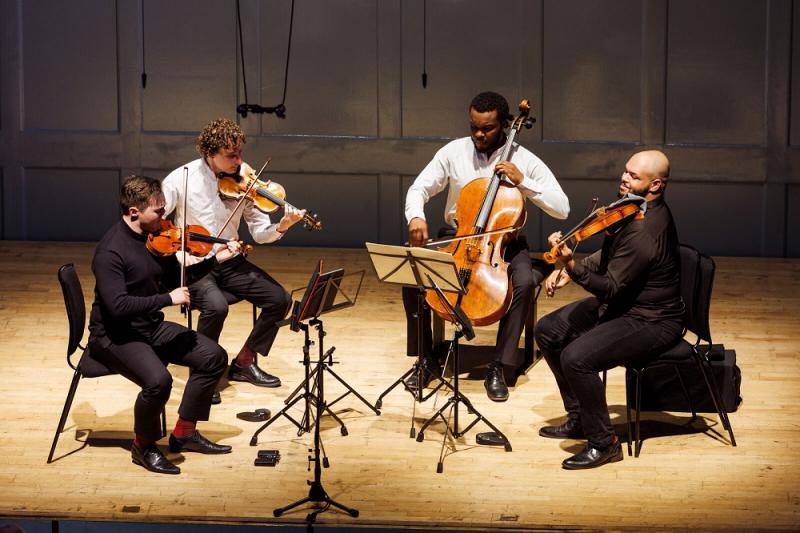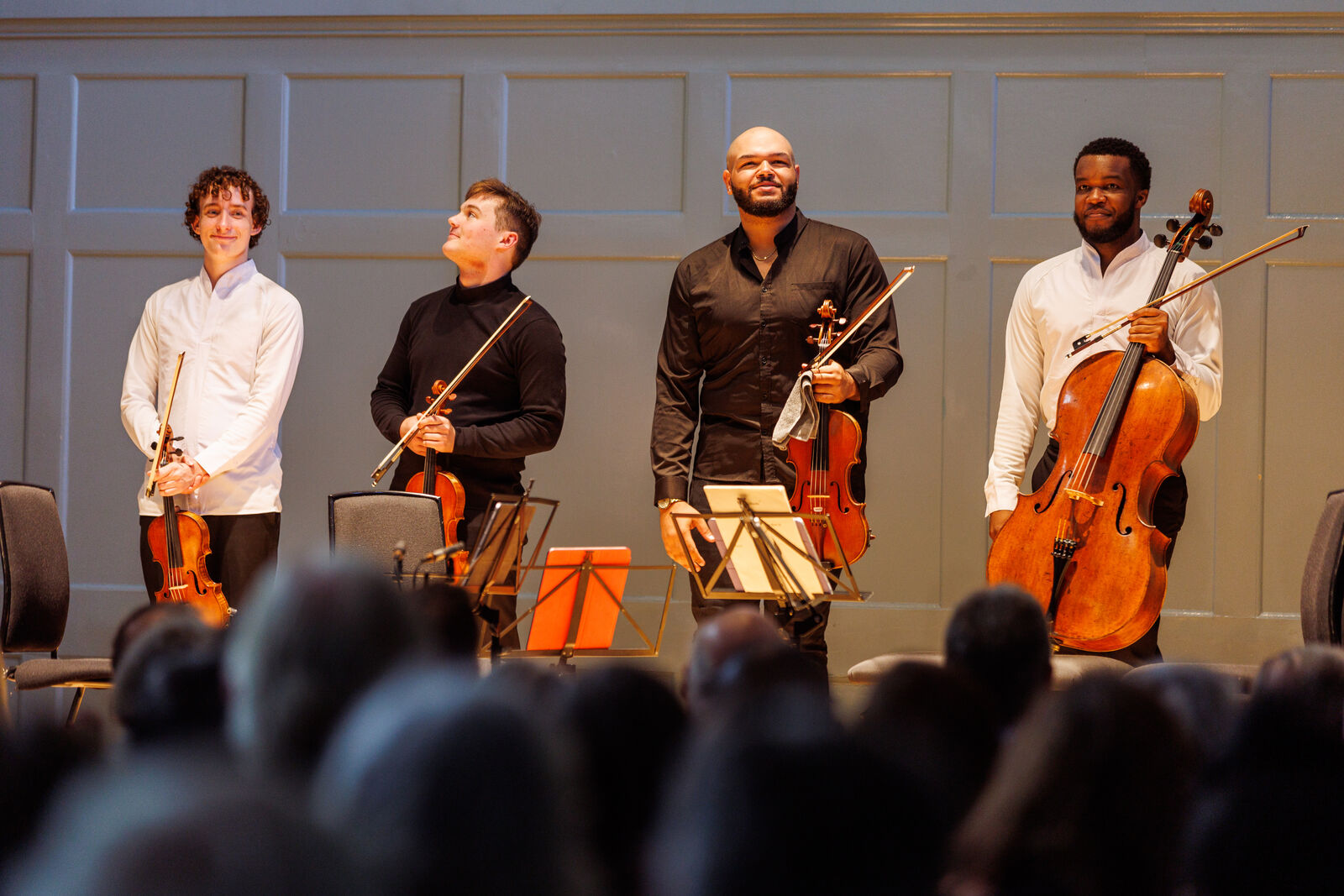Isidore Quartet / Mao Fujita, Edinburgh International Festival 2023 - carefree beauty and improvisatory flair | reviews, news & interviews
Isidore Quartet / Mao Fujita, Edinburgh International Festival 2023 - carefree beauty and improvisatory flair
Isidore Quartet / Mao Fujita, Edinburgh International Festival 2023 - carefree beauty and improvisatory flair
Two impressive debuts come towards the end of the Queen’s Hall series

The Edinburgh International Festival’s Queen’s Hall series ended with two very impressive debuts. Thursday morning brought the Isidore Quartet, who winningly, if slightly naively, told us that Edinburgh had a similar energy to their native New York.
These four young men – the oldest member is 24 – were charm personified in the second of Haydn’s “Sun” Quartets, combining easy grace with carefree beauty, and using vibrato only discreetly to colour the sound carefully. Similarly, their take on the third of Mendelssohn’s Op 44 Quartets combined delicacy with warmth and terrific clarity of textures. The most interesting thing on their programme, however, was the Second Quartet by Billy Childs, a composer much better known as a jazz pianist. Calling it Awakening, Childs wrote the quartet as a reflection on a period of his wife’s serious illness, and it’s a terrific tone poem as well as proof that Childs is impressively proficient in writing for the genre. (Pictured below: Phoenix Avalon, Adrian Steele, Devin Moore and Joshua McClendon taking a bow). The first movement is full of anguished figurations and frenzied effects like buzzing ponticelli to evoke the terror of hearing of her illness, while the second movement contains eerie harmonic glissandi to represent the whirr of the hospital machinery. The final movement moves forwards, though, to chart her recovery and their moving into a new phase of their relationship with soft textures, gorgeous harmonies and soaring melodies. It’s an enormously impressive piece, played with conviction and clarity by these musicians.
The first movement is full of anguished figurations and frenzied effects like buzzing ponticelli to evoke the terror of hearing of her illness, while the second movement contains eerie harmonic glissandi to represent the whirr of the hospital machinery. The final movement moves forwards, though, to chart her recovery and their moving into a new phase of their relationship with soft textures, gorgeous harmonies and soaring melodies. It’s an enormously impressive piece, played with conviction and clarity by these musicians.
Japanese pianist Mao Fujita (pictured below by Dovile Sermokas) took the Queen’s Hall stage in the final solo recital of the festival. A bit like violinist Clara-Jumi Kang, he cuts a slight, almost fragile figure when he appears on stage… until he starts to play, and he attacked Liszt’s B minor Sonata with athletic strength and, much more importantly, a convincing sense of the piece’s overall architecture, without which no pianist should even begin. Even at the end, for example, he could read beyond the notes to undermine the apparent resolution of the final bars: it’s clear to him that there’s a reason why that persistent bottom B never really goes away. He played with wonderful nobility of tone and with plenty of light and shade, too: the climaxes sounded impassioned, but he was unafraid to shade his tone and slow right down for the nobility of the lyrical major key themes.  He preceded the Liszt with a series of Fantasias and Rondos by Mozart that were designed to illustrate the composer’s skill as an improviser, though he was a little too bound by the page in several of these: you could hear the bar lines in lots of places, despite playing of lovely delicacy. He was on much stronger ground in the C minor Sonata K457, which was urgent and dynamic in its outer movements, with a beautifully expressive central Adagio which, ironically, often sounded more free-spirited and relaxed than did the pieces designed to sound improvisatory.
He preceded the Liszt with a series of Fantasias and Rondos by Mozart that were designed to illustrate the composer’s skill as an improviser, though he was a little too bound by the page in several of these: you could hear the bar lines in lots of places, despite playing of lovely delicacy. He was on much stronger ground in the C minor Sonata K457, which was urgent and dynamic in its outer movements, with a beautifully expressive central Adagio which, ironically, often sounded more free-spirited and relaxed than did the pieces designed to sound improvisatory.
rating
Share this article
The future of Arts Journalism
You can stop theartsdesk.com closing!
We urgently need financing to survive. Our fundraising drive has thus far raised £49,000 but we need to reach £100,000 or we will be forced to close. Please contribute here: https://gofund.me/c3f6033d
And if you can forward this information to anyone who might assist, we’d be grateful.

Subscribe to theartsdesk.com
Thank you for continuing to read our work on theartsdesk.com. For unlimited access to every article in its entirety, including our archive of more than 15,000 pieces, we're asking for £5 per month or £40 per year. We feel it's a very good deal, and hope you do too.
To take a subscription now simply click here.
And if you're looking for that extra gift for a friend or family member, why not treat them to a theartsdesk.com gift subscription?
more Classical music
 Hallé John Adams festival, Bridgewater Hall / RNCM, Manchester review - standing ovations for today's music
From 1980 to 2025 with the West Coast’s pied piper and his eager following
Hallé John Adams festival, Bridgewater Hall / RNCM, Manchester review - standing ovations for today's music
From 1980 to 2025 with the West Coast’s pied piper and his eager following
 Kaploukhii, Greenwich Chamber Orchestra, Cutts, St James's Piccadilly review - promising young pianist
A robust and assertive Beethoven concerto suggests a player to follow
Kaploukhii, Greenwich Chamber Orchestra, Cutts, St James's Piccadilly review - promising young pianist
A robust and assertive Beethoven concerto suggests a player to follow
 Robin Holloway: Music's Odyssey review - lessons in composition
Broad and idiosyncratic survey of classical music is insightful but slightly indigestible
Robin Holloway: Music's Odyssey review - lessons in composition
Broad and idiosyncratic survey of classical music is insightful but slightly indigestible
 Classical CDs: Wolf-pelts, clowns and social realism
British ballet scores, 19th century cello works and contemporary piano etudes
Classical CDs: Wolf-pelts, clowns and social realism
British ballet scores, 19th century cello works and contemporary piano etudes
 Bizet in 150th anniversary year: rich and rare French offerings from Palazzetto Bru Zane
Specialists in French romantic music unveil a treasure trove both live and on disc
Bizet in 150th anniversary year: rich and rare French offerings from Palazzetto Bru Zane
Specialists in French romantic music unveil a treasure trove both live and on disc
 Scottish Chamber Orchestra, Ibragimova, Queen’s Hall, Edinburgh review - rarities, novelties and drumrolls
A pity the SCO didn't pick a better showcase for a shining guest artist
Scottish Chamber Orchestra, Ibragimova, Queen’s Hall, Edinburgh review - rarities, novelties and drumrolls
A pity the SCO didn't pick a better showcase for a shining guest artist
 Kilsby, Parkes, Sinfonia of London, Wilson, Barbican review - string things zing and sing in expert hands
British masterpieces for strings plus other-worldly tenor and horn - and a muscular rarity
Kilsby, Parkes, Sinfonia of London, Wilson, Barbican review - string things zing and sing in expert hands
British masterpieces for strings plus other-worldly tenor and horn - and a muscular rarity
 From Historical to Hip-Hop, Classically Black Music Festival, Kings Place review - a cluster of impressive stars for the future
From quasi-Mozartian elegance to the gritty humour of a kitchen inspection
From Historical to Hip-Hop, Classically Black Music Festival, Kings Place review - a cluster of impressive stars for the future
From quasi-Mozartian elegance to the gritty humour of a kitchen inspection
 Shibe, LSO, Adès, Barbican review - gaudy and glorious new music alongside serene Sibelius
Adès’s passion makes persuasive case for the music he loves, both new and old
Shibe, LSO, Adès, Barbican review - gaudy and glorious new music alongside serene Sibelius
Adès’s passion makes persuasive case for the music he loves, both new and old
 Anja Mittermüller, Richard Fu, Wigmore Hall review - a glorious hall debut
The Austrian mezzo shines - at the age of 22
Anja Mittermüller, Richard Fu, Wigmore Hall review - a glorious hall debut
The Austrian mezzo shines - at the age of 22
 First Person: clarinettist Oliver Pashley on the new horizons of The Hermes Experiment's latest album
Compositions by members of this unusual quartet feature for the first time
First Person: clarinettist Oliver Pashley on the new horizons of The Hermes Experiment's latest album
Compositions by members of this unusual quartet feature for the first time

Add comment